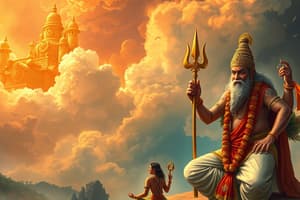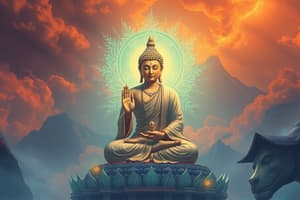Podcast
Questions and Answers
What role do religious songs and chants play during festive occasions?
What role do religious songs and chants play during festive occasions?
They are often performed.
What major holidays are celebrated in Indian culture?
What major holidays are celebrated in Indian culture?
Ganesh Chaturthi, Makar Sankranti, and Janmashtami
How does Hinduism view the concept of reincarnation?
How does Hinduism view the concept of reincarnation?
Every person goes through many births and deaths on Earth until achieving enlightenment.
How do Hindus typically handle funerals compared to other cultures?
How do Hindus typically handle funerals compared to other cultures?
Why do Indians tend to treat elderly family members in particular ways?
Why do Indians tend to treat elderly family members in particular ways?
What is the significance of Diwali in Hindu culture?
What is the significance of Diwali in Hindu culture?
How is Holi celebrated in Hinduism?
How is Holi celebrated in Hinduism?
What event does Dussehra commemorate?
What event does Dussehra commemorate?
What is the significance of Durga Puja in Indian culture?
What is the significance of Durga Puja in Indian culture?
How are Indian culture and Hinduism intertwined?
How are Indian culture and Hinduism intertwined?
What are some common features found in different branches of Hinduism?
What are some common features found in different branches of Hinduism?
Flashcards are hidden until you start studying
Study Notes
Hinduism is one of the oldest living religions in the world, originating over four millennia ago from the Vedic period. It's more accurately described as a dharma rather than a religion because it incorporates all aspects of life into religious practice. This ancient tradition has become intertwined with India's cultural identity, making it difficult to separate history from faith. Its practices, customs, beliefs, rituals, mythology, philosophy, music, art, architecture, literature, cuisine, fairs, festivals, ceremonies, rites, beliefs, and dogmas form part of its essence. Hinduism contains many different traditions, such as Shaktism, Shaivism, Vaishnavism, and Smarta Hinduism, which detail various deities and their forms of worship. Despite this variety, there are common features found throughout these branches, including reverence for multiple gods, acceptance of karma, meditation, and devotion.
Indian culture is deeply connected to Hinduism. Many celebrations observed by Indian people today have Hindu origins. For instance, Diwali, known as the 'festival of lights', commemorates Lord Ram's return to his kingdom after spending years in exile. Holi, another popular festival, honors the goddess Holika while Dussehra marks Rama's triumph over Ravana. These events pay tribute to the gods through colorful processions and bonfire nights. At Durga Puja, temples display statues of the Goddess Durga for 10 days before immersing them in water amidst feasting, dancing, singing, and merrymaking. Other major holidays include Ganesh Chaturthi, Makar Sankranti, and Janmashtami. Religious songs and chants are often performed during many festive occasions.
The concept of reincarnation plays a key role within both Hinduism and Indian culture. According to Hindu belief, every person goes through many births and deaths on Earth until achieving enlightenment. Consequently, Hindus hold funerals differently compared to other cultures – they cremate bodies instead of burying them. Additionally, Indians tend to treat elderly family members in particular ways due to the belief that older individuals may have lived through several lifetimes.
In summary, Hinduism permeates Indian society, influencing everything from daily activities to special occasions like weddings. From prayers offered at sunrise to offerings made to the gods, Hinduism shapes how Indians live out their lives.
Studying That Suits You
Use AI to generate personalized quizzes and flashcards to suit your learning preferences.




